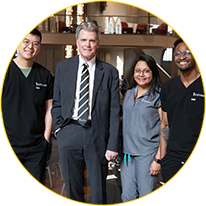contact
Yulvonnda Brown
Office Manager
F 410-706-0865
Postdoctoral Education
Postdoctoral fellows interested in obtaining training in the general areas of neuroscience and pain may contact individual faculty in the Department of Neural and Pain Sciences. Additionally, specific postdoctoral training in the Training Program in Oral and Craniofacial Biology funded by the NIH exists as described below.
Program structure and curriculum for postdoctoral fellows
(U.S. citizens or permanent residents only)
Objectives
The goal of the long-term postdoctoral training experience is to develop oral health research investigators who are qualified to conduct clinical and basic research in areas relevant to the goals of the NIDCR.
Individuals admitted as postdoctoral fellows in our training program must have training in an area that is relevant to the goals of the NIDCR. In addition, the person should be willing to spend at least two years in the program. Typically these individuals will come to our program through our recruiting efforts and by referral from department chairs within the school. The Internal Advisory Committee will serve as the panel for reviewing the credentials of applicants.
The most important step in the training of our postdoctoral fellows will be the initial pairing with the appropriate mentors. Potential trainees will be invited to interview with the Internal Advisory Committee and potential mentors. In many cases it is expected that the candidate will have applied because they were already interested in collaborating with one or more program faculty. If this is not the case, the Internal Advisory Committee will review the applicant’s CV and recommend a primary mentor. If the primary mentor and applicant will be engaged in clinical research specific basic scientist mentors will be identified to interact with the pair. Likewise, mentors and trainees engaged in basic research will be directed toward specific clinical mentors. After the interview process, the advisory committee evaluates the compatibility of the applicant and potential mentors and assesses the likelihood for success. Recommendations for appointment are then made to the Program Oversight Committee.



